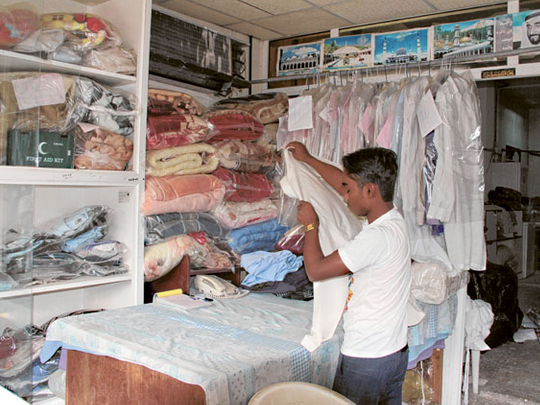
Abu Dhabi: While many laundries and dry cleaners across the capital are looking at ways to expand their businesses, numerous others are shutting down as a result of municipal regulations for the industry.
These regulations, which were introduced last October by Abu Dhabi Municipality, stipulate a minimum area of 30 square metres for a laundry with either washing or ironing services and 40 square metres for a store that has both washing and ironing facilities. Store owners must also provide for washed and unwashed items to be kept in separate baskets or spaces.
They have been given a year to comply with the regulations, which municipality officials say will improve both the hygiene and the quality of service provided.
"One of my laundries is spread over 25 square metres, and I pay Dh28,000 in rent every year. Fortunately, the store next door, which is of a similar size, will be vacated by its current owners soon. I have plans to rent it and expand my laundry," said Ijaz Bhatti, owner of the Riyadh Laundry on Muroor Road.
"Still, I will be forced to shut down my other laundry on Airport Road, as the rent is too high for me to consider expansion in that area," he added.
Mixing of clothes
Bhatti however said he followed hygienic practices even within the limited confines of his facility.
M.U., the owner of another laundry that opened on Khalifa Street in 1982, said, "My laundry is just 16 square metres, but I am particular about cleanliness and hygiene.
"I don't believe a bigger laundry means better service or cleaner work areas, especially as many of the bigger facilities also mix unclean laundry from hotels and hospitals with residents' garments."
The Indian laundry owner said he will be forced to close down operations as a result of the new standards.
"I have already shut down two of my other laundries, and have let my workers go. I also know of more than five other laundry owners who have been forced to follow the same route," he added.
Risky
According to Khalifa Mohammad Al Rumaithi, director of public health at the municipality, more than 50 per cent of the laundries in the capital are smaller than the minimum size requirements.
Currently, he said there are more than 1,000 laundries in the capital city.
"This is a risk to both customers of a laundry and the workers. We visited many facilities and noticed that unwashed clothes were being mixed with washed ones in areas with poor lighting and lots of chemical fumes. These are the unsafe practices we want to curb," Al Rumaithi told Gulf News.
When asked whether the new regulations would create a dearth of laundries in the capital, the official said there was no such risk.
"Every week, we license at least three new laundries in Abu Dhabi city. It is a profitable service and other investors will rush in to replace any that cease to exist," Al Rumaithi said.
Residents welcome municipality standards for laundries Residents who were informed about the new standards for laundries in the capital welcomed the municipality regulations, saying they would force laundry service providers to become more professional.
"I used to give in clothes for washing every week to a small laundry, but many of them would come back unwashed or with tears. At times, they would even forget some of my items when returning my load to me," said Monaza Shaikh, a 26-year-old teacher from England.
"In my opinion, the municipal regulations will induce laundries to become more careful. I myself switched to a bigger laundry that takes better care of my clothes, even though I have to pay more now," she added.
Agreeing with Shaikh, Rezaul Karim, a 28-year-old shop manager from Bangladesh, said bigger laundries would probably provide better customer service.
"I have faced many instances where my whites have been washed with coloured items and been spoilt as a result, so I welcome this new municipality initiative that focuses on the customer's needs," he said.
Commercial activity
Outlets to be relocated
Within the next two months, all building material traders and carpenters will have relocated to the Mussaffah area, Khalifa Al Rumaithi, director of public health at Abu Dhabi Municipality, told Gulf News.
The municipal decision, which also requires metal workshops, scrap material traders and equipment repairmen to relocate, will free up commercial space in the capital for the trading of more essential items like medicines and food, Al Rumaithi explained.
"This decision was implemented over the last year, and 935 outlets have already complied. A total of 172 more outlets are expected to follow suit by the end of April," he said.
In addition, auto retailers and garages have also been required to relocate from any premises situated between Falah Street and the Corniche area.
Residents welcome move
Residents who were informed about the new standards for laundries in the capital welcomed the regulations, saying they would force laundry service providers to become more professional.
"I used to give in clothes for washing every week to a small laundry, but many of them would come back unwashed or with tears. At times, they would even forget some of my items when returning my load to me," said Monaza Shaikh, a 26-year-old teacher from England.
"The municipal regulations will induce laundries to become more careful," she said. Rezaul Karim, a 28-year-old shop manager from Bangladesh, said bigger laundries would probably provide better service.
"I have faced many instances where my whites have been washed with coloured items, and been spoilt as a result, so I welcome this new municipality initiative that focuses on customer's needs," he said.
— S.Z.












